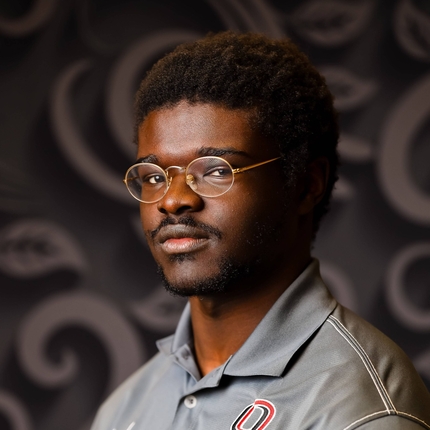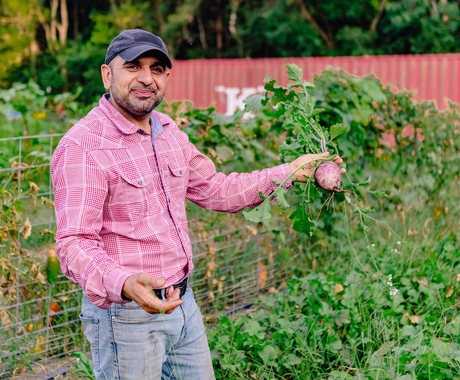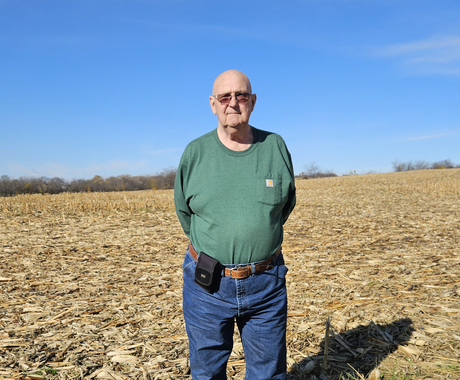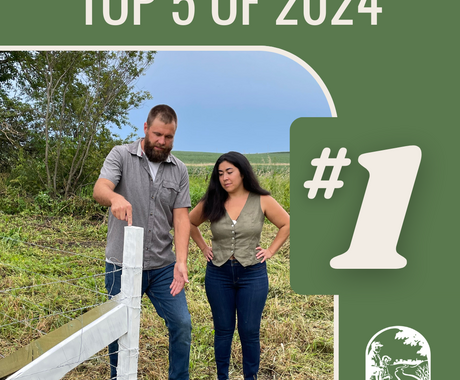A desire to help feed the hungry and care for the planet led Peter David to explore the world of agriculture. Implementing conservation practices helps him work toward those goals.
Before emigrating to the U.S. from South Sudan, Peter’s parents were subsistence farmers. Growing up, Peter heard stories about the struggles of that type of work. He became curious as an adult, and found the idea of agricultural life compelling in the midst of his online classes during the global COVID-19 pandemic.
In February 2022, Peter started farming for himself. He’s had the opportunity to use land at Big Muddy Urban Farm, in Omaha, Nebraska. There, he works on about one-fourth an acre, uses a 40-by-20-foot high tunnel, and has been able to implement some conservation practices.
“The drastic outcomes of every climate report has me worried about the future,” said Peter. “Conservation seems like the best thing to implement on a large scale to make change on a global scale.”
As a way to gain more experience with conservation practices, Peter applied to the Center for Rural Affairs’ 2022 Beginning Farmer Conservation Fellowship Program, and was chosen to participate.
The Center started this program for beginning farmers and ranchers who would like guidance in implementing conservation programs. The fellows complete coursework in conservation programs and practices, climate change adaptation and impacts, racial equity, and leadership.
They also design and implement a conservation project on their own farm or land they are farming, and present their findings at the annual Nebraska Sustainable Agriculture Conference in February, when the program ends.
On the land Peter farms, he implements no-till and livestock land integration as a way to conserve soil health.
“These practices are simple, and while the complexity of industrial agriculture produces great yields, it'll deplete soil health way faster than we can restore it,” he said. “I'd rather use the technology and intelligence gathered over the past century or so to prevent the issues down the line over prioritizing high profits.”
For his fellowship conservation project, Peter is raising 30 meat birds in a chicken tractor, a movable coop lacking a floor. He’ll integrate the animal waste into the land as a form of fertilizer to bolster the soil and protect against soil degradation. Because of cold winter weather, Peter is raising the birds in a high tunnel for protection at this time. He plans to test the soil this coming season and compare the results to last season to see if it made any reasonable amount of change in the soil composition.
“I built the chicken tractor already, so when next season begins I'll bring in another flock of birds and this time have the birds outside in the tractor as a way to prepare beds for the latter one-third of the season,” Peter said.
At the end of the season, he plans to weigh and process the birds, then sell them for profit.
“I hope to use the birds to achieve a greater nutrient density within the soil as well as a new source of income for Big Muddy Urban Farm in the foreseeable future,” Peter said.
Through the fellowship, Peter hopes to gain knowledge to apply to his future farm and use that knowledge to build on the agricultural skills he has already acquired.
“I'd personally hate to see the world on fire when I make it to my twilight years, so I want to do what I can to fight the food crises of the future,” he said.
Eventually, he plans to take the knowledge gained from this experience back to South Sudan, where he can build a farm and inspire others to do the same.
“Hunger is a big problem worldwide, and food insecurity is hurting my people,” Peter said. “I want to do my part to reduce it.”
We are accepting mentor applications for our Beginning Farmer Conservation Fellowship Program, learn more at cfra.org/beginning-farmer-conservation-fellowship-program.





